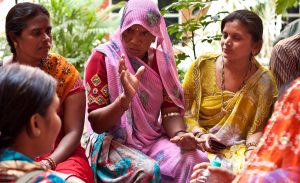Gender parity is a long way off in India’s political and electoral arena with political parties remaining reluctant to field more women in elections. In the ongoing multi-phase elections for four state assemblies and one union territory, parties have fielded just a handful of women in the electoral contest.
Of the 3,559 candidates vying for 238 seats in the Tamil Nadu State assembly, just 380 (11 percent) are women. The ruling All India Anna Dravida Munnetra Kazhagam (AIADMK) has just 14 women (8 percent) among its 171 candidates in the fray. There are only 11 (6.3 percent) women among the Dravida Munnetra Kazhagam’s (DMK) 173 contestants and of the 25 candidates fielded by its ally, the Congress, just one is a woman. The Bharatiya Janata Party (BJP), the AIADMK’s partner, has three women among its 20 candidates.
Even self-proclaimed progressives have kept women from contesting. At an election rally in December, Kamal Haasan, founder and leader of the newly-formed Makkal Needhi Maiam (MNM) expressed concern over the small number of women in the Tamil Nadu assembly. Yet, when it came to deciding on candidates for the assembly election, this concern did not determine his decisions. Just 12 of the 154 people contesting the election on the MNM plank are women. The only party in Tamil Nadu that has fielded women commensurate with their numbers in the population is the Naam Tamilar Katchi (NTK). Fifty percent of the NTK’s candidates are women.
Neighboring Kerala is better off than other Indian states on human development indicators; according to Census 2011, the state has a sex ratio of 1,084 women to every 1,000 men compared to the national average ratio of 940 women per 1,000 men. However, there is little parity when it comes to elections. Of the 420 candidates in the fray for 140 seats in the state assembly, just 38 (9 percent) are women.
In the northeastern state of Assam, only 74 (7.8 percent) of the 946 candidates are women.
The story is similar in West Bengal. Of the Trinamool Congress’ 294 candidates, 50 are women. There are 35 women in the BJP’s list of 283 candidates and 38 women in the Left-Congress-Indian Secular Front alliance’s list of 250 candidates. While the number of women fielded by the Trinamool Congress “is much lower than what equity would demand,” its setting aside of 17 percent of seats for women is “higher” than that allotted by its rivals.
Clearly, political parties across the board are reluctant to field women candidates. Why is this so? According to experts, women are often considered weak and fielding them in elections is looked upon as a “risk.” However, data from a string of recent elections indicates just the opposite: that women are doing well in elections and a “good bet.”
If women are less successful, this is not because of any inherent shortcoming on their part but because the few who are running are often allotted constituencies where the party’s chances of winning are slim. In Kerala, the Congress “typically gives unwinnable seats to women”; in the 2016 state assembly elections, all the eight women candidates from the party lost.
While the overwhelming majority of political parties have refrained from fielding a reasonable number of women in the elections, all of them recognize the value of women’s votes.
In Tamil Nadu and Kerala women voters outnumber men, while in Bengal they account for 49 percent of the electorate. Besides, the turnout of women voters is robust. Importantly, unlike the experience decades ago, when a woman’s vote was influenced by the decision of the family patriarch, increasingly she has become independent in choosing whom she votes for.
With this in mind, political parties are wooing women in the ongoing election campaign.
In Tamil Nadu, the coalitions led by the AIADMK and the DMK as well as the MNM have promised monetary assistance to women heads of households. They are vying with each other to lure women voters with promises of providing them maternity leave, washing machines, free bus passes, etc.
In Kerala, the LDF has promised women washing machines, food processors, and refrigerators if it returns to power. “The goal is to lighten the household chores for women,” it said in its election manifesto. It has also promised homemakers a pension. Meanwhile, the opposition Congress-led United Democratic Front (UDF) in the state announced a monthly dole of 2,000 rupees for all women in the 40-60 age group.
Women’s rights activists are not impressed with the grand promises parties are making to women voters. Underlying the handouts is the perception of women as helpless and needing male protection. “Within this paternalistic view, you can only imagine fathers, brothers and uncles providing all these benevolent perquisites for their womenfolk,” points out Swarna Rajagopalan, founder of Prajnya, a Chennai-based gender rights organization.
India’s patriarchal political parties are doling out freebies to women to win their votes. But they are unwilling to go beyond that to share power with women.
Interestingly, most parties that are in the current electoral fray have supported reserving one-third of seats for women in the national parliament and state assemblies.
While the Women’s Reservation Bill is yet to be enacted, parties claiming to support this legislation could help in realizing its objective by ensuring gender parity in the election of candidates, so that at legislatures have at least 33 percent of their seats occupied by women. They need not wait for the bill to become law.
That none of them have done so indicates their shallow commitment to women’s empowerment.

































